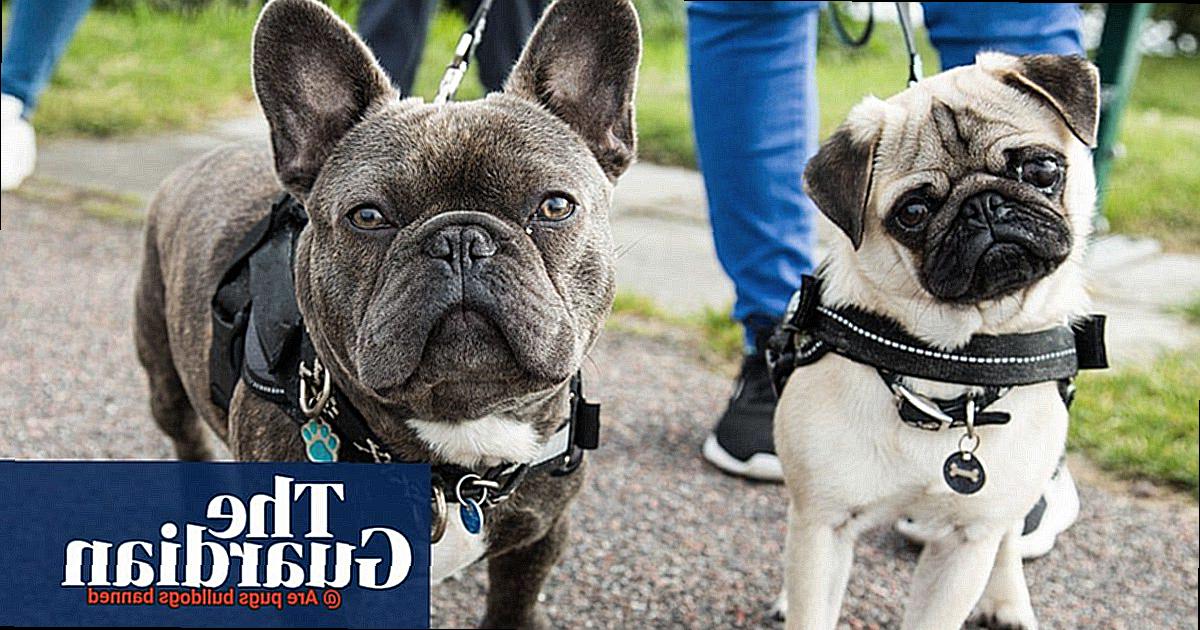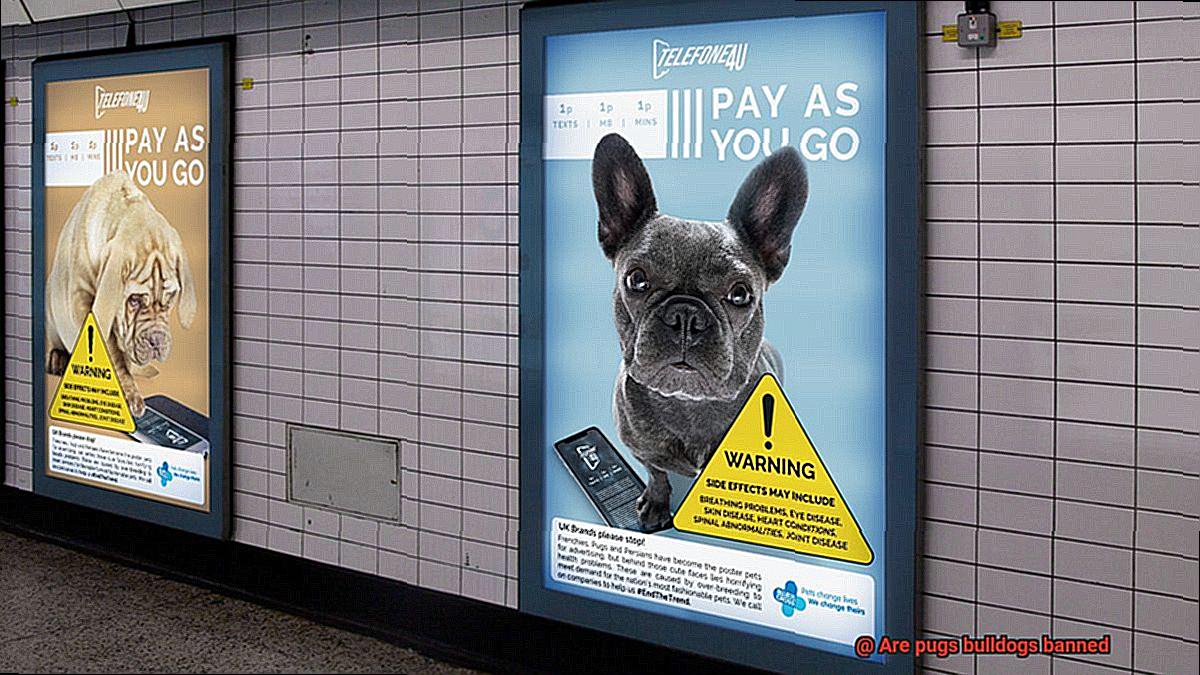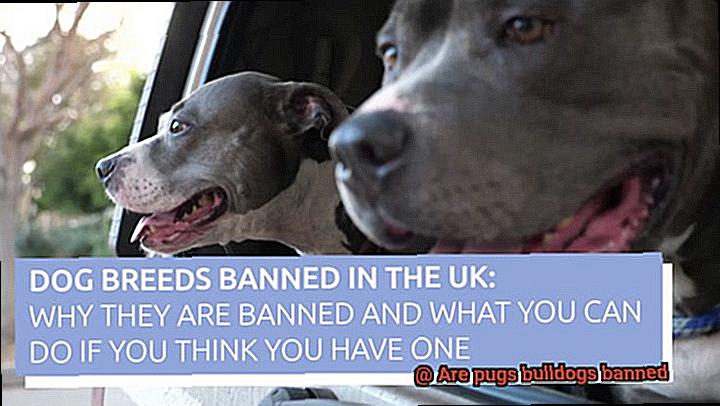Are pugs bulldogs banned?
Have you ever fallen head over heels for the irresistible charm of pugs and bulldogs? If so, you might have stumbled upon some unsettling rumors about their legal status. Are these lovable breeds banned in certain places? Are these bans widespread or just limited to specific regions? Today, we embark on a journey to uncover the truth behind the laws and regulations surrounding these adorable four-legged companions.
Pugs and bulldogs have captured hearts worldwide with their unique features and affectionate personalities. However, concerns about their health and well-being have prompted several countries and regions to take action. In an effort to address issues related to extreme brachycephalic features, the Kennel Club in the United Kingdom introduced breed standard revisions for bulldogs and pugs. But, contrary to popular belief, this does not mean they are banned outright in the UK.
Beyond British borders, countries like Australia and New Zealand have implemented stricter regulations on importing and breeding pugs and bulldogs. These measures aim to combat health concerns such as breathing difficulties by encouraging responsible breeding practices that prioritize the welfare of these beloved breeds.
While specific bans may exist in certain municipalities or private housing communities, it’s important not to generalize these restrictions as universal bans on pugs and bulldogs. Understanding the nuances of these regulations can help potential owners navigate the legal landscape and make informed decisions about welcoming these delightful dogs into their lives.
In this blog series, we will delve deeper into the legal restrictions, welfare considerations, and responsible ownership practices specific to pugs and bulldogs across various regions. Additionally, we will debunk common misconceptions surrounding these breeds so that you can separate fact from fiction.
Whether you’re a passionate enthusiast of pugs or bulldogs, a curious pet lover seeking knowledge, or someone contemplating adding one of these charismatic breeds to your family, this series aims to provide a comprehensive overview of the current state of pugs and bulldogs in the world of animal regulations and ownership.
Stay tuned for our next installment, where we will explore the United States’ approach and the ongoing debate surrounding pug and bulldog ownership. Together, we will unveil the truth and dispel the myths surrounding these beloved breeds.
Are Pugs and Bulldogs Banned?
Contents
- 1 Are Pugs and Bulldogs Banned?
- 2 Health Concerns Associated with Pugs and Bulldogs
- 3 Pros of BSL for Pugs and Bulldogs
- 4 Cons of BSL for Pugs and Bulldogs
- 5 Understanding the Laws in Your Area Regarding Pugs and Bulldogs
- 6 Responsible Ownership of Pugs and Bulldogs
- 7 How Can We Prevent Unhealthy Breeding Practices?
- 8 Alternatives to Breed Bans
- 9 Conclusion
Pugs and bulldogs, with their adorable squishy faces and lovable personalities, have captured the hearts of dog lovers around the world. However, there has been controversy surrounding the ownership of these breeds. In this article, we will explore whether pugs and bulldogs are banned and shed light on the topic for French bulldog owners.
Breed-Specific Legislation (BSL): A Hot Topic
Breed-specific legislation (BSL) refers to laws or regulations that restrict or ban certain dog breeds based on perceived dangers or risks associated with them. Pugs and bulldogs are often targeted by BSL due to their brachycephalic facial structure, which can lead to health issues.
Bans and Restrictions Exist in Some Places
While pugs and bulldogs are not banned in general, there are certain restrictions and regulations regarding their ownership in some countries or regions. For example, some airlines have implemented bans or restrictions on the transportation of brachycephalic dogs due to the increased risk of respiratory distress during travel.
The Debate: Health Concerns vs. Responsible Ownership
The main concern with pugs and bulldogs is their brachycephalic anatomy, which can result in breathing difficulties, eye problems, and overheating. Proponents of BSL argue that banning these breeds is necessary to protect their welfare and prevent the perpetuation of unhealthy traits through irresponsible breeding practices.
Variation in BSL
It is crucial to note that breed bans and restrictions vary across different countries and regions. Some places have stricter regulations than others. Therefore, it is essential for potential owners of pugs or bulldogs to research and understand the laws and regulations in their specific area before getting a dog of these breeds.
Responsible Ownership: Mitigating Health Risks

Responsible ownership plays a significant role in mitigating the health risks associated with pugs and bulldogs. By providing proper care, regular veterinary check-ups, and practicing responsible breeding, owners can help alleviate concerns about banning these breeds.
Education and Advocacy
Various organizations and advocacy groups work towards promoting responsible ownership and challenging breed-specific bans or restrictions. It is important for pug and bulldog owners to stay informed about these efforts and actively participate in educating others about the specific needs and potential health issues of these breeds.
Health Concerns Associated with Pugs and Bulldogs
We all know how irresistible these wrinkly-faced pups are, but it’s important to be aware of the health concerns that come with their unique characteristics. So, let’s dive into the nitty-gritty of what you should watch out for.
- Respiratory Problems: Due to their smushed-in faces, French Bulldogs, like their Pug counterparts, often struggle with respiratory issues. Their short nasal passages and narrow windpipes make it harder for them to breathe properly. You might notice your Frenchie having breathing difficulties, snoring like a chainsaw, or panting excessively, especially during physical activity.
- Overheating: French Bulldogs are notorious for their poor heat regulation. Their compacted airways make it difficult for them to cool down efficiently, putting them at higher risk of overheating. So, it’s crucial to keep them cool and provide plenty of shade and water during hot weather or intense exercise.
- Eye Problems: Those adorable bulging eyes that melt our hearts can unfortunately lead to various eye issues. French Bulldogs are prone to injuries, infections, ulcers, cherry eye (prolapse of the tear gland), and dry eye syndrome. Regular eye checks and gentle cleaning are essential to keep those peepers healthy.
- Skin Troubles: Wrinkles may be cute, but they can be a breeding ground for bacteria and yeast infections in French Bulldogs. Additionally, their short coats make them more susceptible to allergies, dermatitis, and other skin irritations. Regular grooming and keeping those skin folds clean and dry can help prevent these issues.
- Joint Problems: The stocky build of French Bulldogs puts extra pressure on their joints, making them more susceptible to joint problems like hip dysplasia and patellar luxation (dislocated kneecap). Watch out for signs of pain, stiffness, and difficulty getting up or walking.
- Dental Woes: French Bulldogs often face dental problems due to their crowded teeth. Tartar buildup can lead to periodontal disease, gum infections, tooth decay, and even tooth loss. Regular brushing and professional dental cleanings are crucial for maintaining good oral hygiene.
- Difficult Births: French Bulldogs have broad heads and narrow pelvises, which can make natural delivery challenging. Many Frenchies require cesarean sections for the safe delivery of puppies. This is something to consider if you’re planning on breeding your Frenchie.
- Weight Management: French Bulldogs have a lower exercise tolerance and a love for food, making them prone to obesity. Keeping them at a healthy weight is essential to prevent various health issues like heart disease, diabetes, and joint problems.
Pros of BSL for Pugs and Bulldogs
Let’s dive into the pros of Breed-Specific Legislation (BSL) for Pugs and Bulldogs. Now, I know what you’re thinking – BSL, is it really a good thing? Well, let me break it down for you and show you how it can actually benefit our beloved wrinkly-faced pals.

- Enhances Public Safety: BSL aims to keep our communities safe by regulating or even banning certain breeds that may pose a higher risk of aggression. Pugs and Bulldogs, with their unique physical characteristics and potential health issues, are often considered at higher risk. By implementing BSL, we can reduce the chances of dog-related incidents like bites or attacks, creating a safer environment for both humans and furry friends.
- Prevents Inhumane Breeding Practices: We all want our Frenchies to be healthy and happy, right? BSL can help discourage irresponsible breeding practices that prioritize exaggerated physical traits over the well-being of our pups. Pugs and Bulldogs have been heavily affected by these practices, resulting in various health problems. With BSL in place, breeders will be encouraged to prioritize the overall health and genetic diversity of these breeds, resulting in healthier and more resilient individuals.
- Promotes Responsible Ownership: BSL serves as a wake-up call for owners to step up their game when it comes to responsible pet ownership. By implementing additional measures like mandatory training, licensing, or insurance for pugs and bulldogs, owners are forced to become more knowledgeable about their pets’ needs and behavior. This leads to improved care, socialization, and responsible handling of our furry companions.
- Reduces Strain on Shelters: Let’s face it – French Bulldogs and Pugs are popular breeds, but they also face higher surrender rates due to their specific care requirements and potential health issues. BSL can help reduce the number of these breeds ending up in shelters or being abandoned due to irresponsible ownership. By discouraging impulsive or ill-prepared individuals from acquiring these breeds, BSL can alleviate the strain on shelters and promote more thoughtful adoption processes.
- Focuses Resources on High-Risk Breeds: BSL allows authorities to prioritize their resources on breeds that are statistically more likely to be involved in incidents. By targeting breeds like Pugs and Bulldogs, which may have higher chances of displaying aggressive behavior due to genetics or health issues, limited resources can be used more efficiently. This means more effective prevention efforts and improved public safety outcomes.
Cons of BSL for Pugs and Bulldogs
In this article, we’ll dive into the cons of BSL for pugs and bulldogs, shedding light on why these laws may not be the best solution for ensuring public safety. So grab a cup of coffee and let’s get started.
Unfair Stigmatization:
BSL unfairly targets and stigmatizes breeds like pugs and bulldogs. Contrary to popular belief, these breeds are known for their friendly and affectionate nature. By focusing solely on breed, BSL fails to consider the individual temperament and behavior of each dog. It’s like judging a book by its cover.
Increased Euthanasia Rates:
One heartbreaking consequence of BSL is the increased euthanasia rates for pugs and bulldogs. When breed-specific bans are enforced, responsible owners may be forced to give up their beloved pets or face legal consequences. This leads to overcrowded shelters and a higher likelihood of euthanasia, even for dogs with no history of aggression. It’s a lose-lose situation.
Ignoring Responsible Ownership:
BSL overlooks the importance of responsible ownership and proper training in preventing dog aggression. Instead of punishing all dogs of a certain breed based on the actions of a few irresponsible owners, education and support for responsible ownership should be emphasized. After all, it’s not just about the breed; it’s about how they are raised and cared for.
Failure to Address Root Causes:
Another drawback of BSL is its failure to address the root causes of dog aggression. Aggressive behavior can stem from various factors such as improper socialization, neglect, abuse, or irresponsible breeding practices. By solely focusing on breed-specific restrictions, BSL fails to tackle the underlying issues that contribute to aggressive behavior in dogs.

False Sense of Security:

BSL can create a false sense of security for the general public. While it may give the impression that dangerous dogs are being targeted and removed from communities, it does not guarantee a reduction in dog-related incidents. Aggressive behavior can be exhibited by dogs of any breed, and by solely focusing on specific breeds, BSL diverts attention from the need for comprehensive dog bite prevention strategies.
Understanding the Laws in Your Area Regarding Pugs and Bulldogs
In today’s ever-changing world, it’s crucial to stay informed about the laws and regulations that govern our lives. This is especially true when it comes to owning pets, such as our adorable pugs and bulldogs. By understanding the laws in your area regarding these breeds, you can ensure that you are in compliance and provide the best care for your furry friends. So, let’s dive in and explore why it’s important to stay on top of these laws.
Breed-Specific Legislation (BSL): What You Need to Know
BSL refers to laws that target specific dog breeds based on their appearance rather than their individual behavior. Unfortunately, pugs and bulldogs often find themselves on the receiving end of BSL due to misconceptions about their temperament or health issues. These laws can range from breed bans to regulations such as mandatory spaying/neutering, microchipping, or liability insurance requirements.
The Impact of BSL on Pug and Bulldog Owners
As a pug or bulldog owner, it’s vital to understand how BSL can affect you and your beloved pet. Some cities or countries may have a complete ban on pugs and bulldogs, making it illegal to own these breeds altogether. In other areas, specific regulations may be in place that could require you to take certain actions or face penalties.
Examples of BSL Around the World
Let’s take a closer look at some places where BSL has been implemented regarding pugs and bulldogs:
- City X: Pugs and bulldogs are completely banned due to concerns about their health issues.
- Country Y: Pug owners must ensure their dogs are microchipped, spayed/neutered, and have liability insurance.
- City Z: Bulldogs are prohibited in certain public spaces but are allowed in residential areas with special permits.
Extending Beyond Breed-Specific Legislation
It’s important to note that laws regarding pugs and bulldogs can extend beyond BSL. For instance, housing restrictions may limit the number of pets you can have or require additional fees for certain breeds. Public spaces and transportation systems may also have rules in place that affect pug and bulldog owners.
Seek Knowledge, Seek Solutions
To navigate the complex legal landscape surrounding pugs and bulldogs, it’s crucial to seek knowledge and stay informed. Start by conducting thorough research, contacting local authorities or animal control agencies, and joining breed-specific organizations or advocacy groups. They can provide valuable insights and support to help you understand and comply with the laws in your area.

Responsible Ownership of Pugs and Bulldogs
In this guide, we will explore the importance of responsible ownership and provide you with essential tips to ensure the health and well-being of your furry companions.
Understanding Brachycephalic Health Concerns:
French Bulldogs, like their Pug counterparts, have unique facial features that make them prone to certain health issues. It is crucial to be aware of these concerns. Common problems include breathing difficulties, overheating, dental issues, and eye conditions. Regular veterinary check-ups are essential for early detection and management of these potential health risks.
Nutrition and Weight Management:
A balanced diet is vital for maintaining your Frenchie’s overall health. Ensure that their food meets their nutritional needs while avoiding overfeeding. Obesity can worsen breathing difficulties, so it’s important to maintain a healthy weight. Consult your veterinarian for appropriate portion sizes and dietary recommendations.
Exercise, but with Caution:
While exercise is essential for keeping your French Bulldog fit, it should be done in moderation due to their brachycephalic nature. Short walks and playtime in a cool and shaded environment are recommended to prevent overheating. Avoid intense physical activities that could strain their breathing.

Grooming for Comfort:
Regular grooming is crucial for your Frenchie’s well-being. Their short coats require minimal brushing to minimize shedding. However, pay special attention to their facial folds, as they can accumulate moisture and bacteria, leading to infections. Clean these folds regularly with a gentle cleanser recommended by your veterinarian.
Socialization and Training:
French Bulldogs are sociable and affectionate companions. To ensure they develop good behavior and prevent aggression, early socialization is vital. Introduce them to various people, animals, and environments from a young age. Positive reinforcement training techniques work best with their stubborn nature, fostering a strong bond between you and your Frenchie.
Financial Considerations:
As responsible owners, we must acknowledge the financial commitment that comes with owning a French Bulldog. Due to their brachycephalic health predispositions, they may require additional veterinary care compared to other breeds. Budget for regular check-ups, vaccinations, and potential medical treatments to provide the best care for your furry friend.
How Can We Prevent Unhealthy Breeding Practices?
French Bulldogs are beloved for their charming personalities and adorable appearances. However, due to their popularity, unhealthy breeding practices have become a significant concern. As an expert in the field, I have witnessed the detrimental effects of these practices on the breed’s health and well-being. In this article, we will discuss various strategies to prevent unhealthy breeding practices and promote the overall welfare of French Bulldogs.
Responsible Ownership:
- Research the breed and understand their specific health concerns.
- Choose reputable breeders who prioritize health and welfare.
- Ask questions about breeding practices and genetic conditions.
Breed Clubs and Organizations:
- Join reputable breed clubs that have strict guidelines and codes of ethics.
- Ensure breeders adhere to health testing requirements.
- Support organizations promoting responsible breeding practices.

Legislation:
- Advocate for laws and regulations that safeguard animal welfare.
- Encourage licensing of breeders and mandatory health testing.
- Restrict harmful breeding practices like inbreeding or excessive breeding.
Education:
- Educate breeders and potential owners about responsible breeding.
- Raise awareness about the risks of unhealthy practices.
- Promote informed decision-making when choosing a breeder.
Adoption:
- Encourage adoption from shelters and rescue organizations.
- Reduce demand for unhealthy breeding practices.
- Give a loving home to a dog in need.
Collaboration:
- Foster collaboration between breeders, veterinarians, and regulatory bodies.
- Develop and enforce standards prioritizing dog health and welfare.
- Hold breeders accountable for their practices.
Genetic Advancements:
- Utilize genetic testing to identify potential genetic conditions.
- Make informed breeding decisions to minimize risk.
- Stay updated on ongoing research in genetics.
Public Awareness Campaigns:
- Spread knowledge about responsible breeding practices.
- Highlight the consequences of supporting unhealthy practices.
- Encourage responsible ownership and breeding decisions.
Alternatives to Breed Bans
Breed bans have long been a controversial topic when it comes to addressing concerns about public safety and aggressive behavior in certain dog breeds. Instead of implementing breed-specific legislation (BSL) or outright bans, alternative approaches that focus on individual dog behavior and owner responsibility can be more effective and fair. In this article, we will explore some alternatives to breed bans that are applicable to French Bulldog owners, promoting responsible ownership and prioritizing the well-being of both dogs and communities.
Breed-Specific Legislation (BSL):
- BSL involves implementing strict regulations on specific breeds, such as French Bulldogs, to ensure responsible ownership.
- Mandatory spaying/neutering, leash and muzzle requirements, special licensing, and training or behavior assessments are common components of BSL.
- BSL shifts the focus from targeting specific breeds to holding owners accountable for their dogs’ behavior.
Education and Community Outreach Programs:
- These programs aim to promote responsible dog ownership through workshops, seminars, and campaigns.
- French Bulldog owners can benefit from learning proper training, socialization, and handling techniques for their beloved pets.
- By educating owners about responsible ownership practices, the focus shifts from blaming specific breeds to emphasizing the importance of responsible pet ownership.
Breed-Neutral Dangerous Dog Laws:
- These laws target individual dogs with a history of aggression or dangerous behavior, regardless of their breed.
- Reporting systems to track aggressive incidents, mandatory evaluations for dogs involved in incidents, and stricter penalties for irresponsible owners are key components.
- By focusing on individual dogs’ behavior rather than their breed, these laws are considered fairer and more effective in preventing dog-related incidents.
Promoting Responsible Breeding Practices:
- Responsible breeding practices can help reduce the likelihood of aggressive behavior in certain breeds like French Bulldogs.
- Selecting for temperament and socialization traits can lead to healthier and well-behaved dogs.
- Encouraging responsible breeding practices reduces the need for breed bans by ensuring that dogs are bred with a focus on their overall well-being.
R5Vt-xhso0Y” >
Conclusion
In conclusion, it is important to clarify that pugs and bulldogs are not banned.
While certain countries and jurisdictions may have regulations or restrictions on specific dog breeds, these rules are generally focused on promoting responsible ownership and ensuring the well-being of both the dogs and the community. It is crucial for potential owners to familiarize themselves with local laws and regulations before bringing home a pug or bulldog.
By doing so, they can ensure they are in compliance with any requirements and provide a loving and safe environment for their furry companions.




